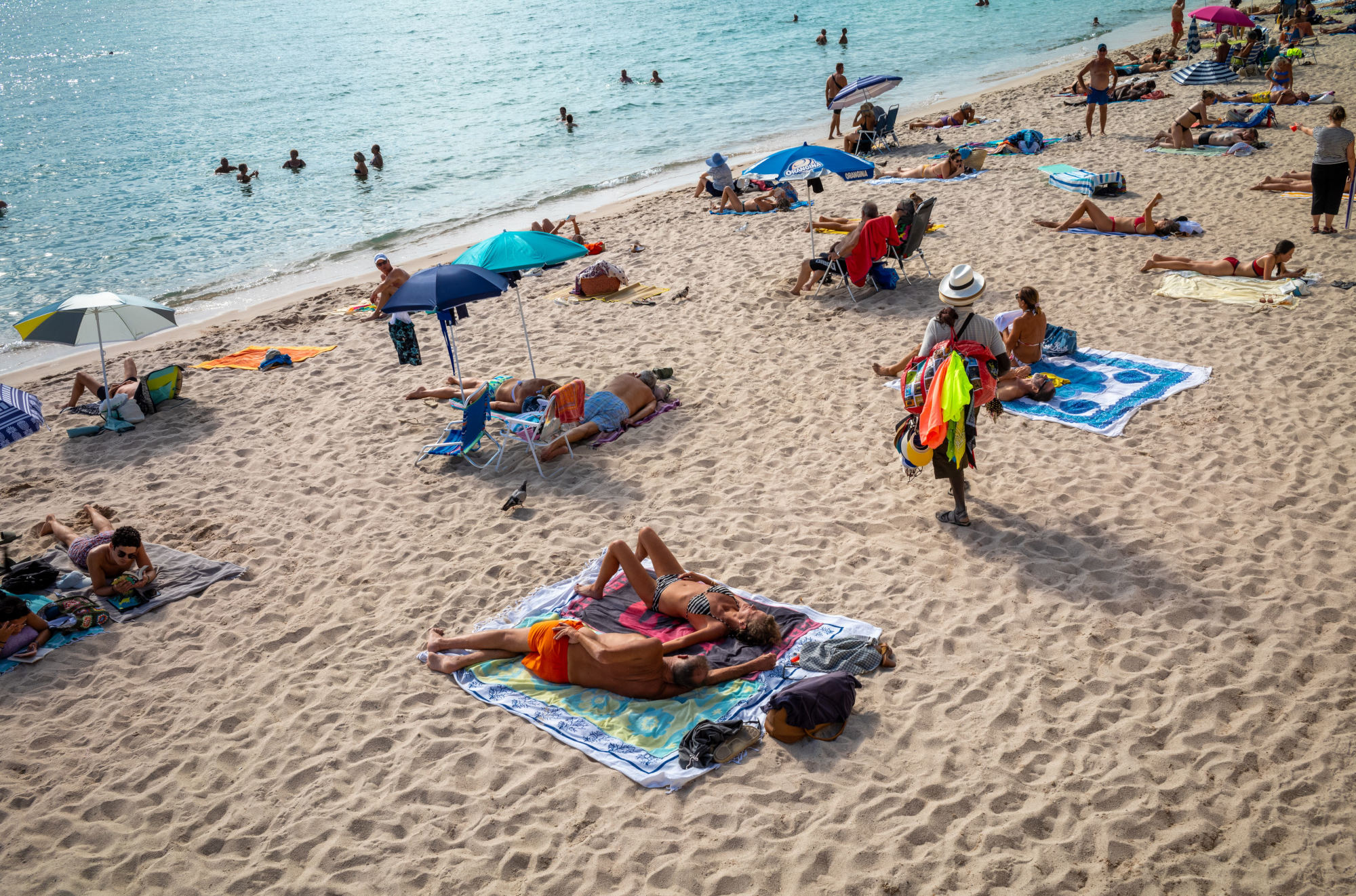Police have been sent out to patrol France’s seaside promenades. Not to chase hardened criminals – but to look for bare-chested tourists. From Les Sables-d’Olonne to Cassis, and in a growing number of coastal towns, local authorities are introducing by-laws banning shirtless men from wandering around in public. The fines are €150 if you’re caught walking from the beach to the bakery in swim shorts and flip-flops, but no shirt. Uniformed gendarmes have been instructed to enforce the rules. Posters have gone up at beaches. Police are stopping tourists, handing out tickets and giving lectures. The summer’s great threat to republican order, it seems, is the male torso.
It’s easier to fine a tourist without a shirt than to deal with drug traffickers on a housing estate
‘We are not nudists’ declared Yannick Moreau, the mayor of Les Sables-d’Olonne, defending the new rules he’s implemented as a matter of ‘respect’ and ‘civic-mindedness’. In Cassis, on the Mediterranean coast, the town hall says the aim of the new measures is to ‘preserve the elegance of the town’. Even the slogans are sanctimonious – ‘Du sable à la ville, on se rhabille’, that’s ‘when going from the beach to the town, we get dressed again.’ One mayor, asked if the policy might be seen as heavy-handed, replied simply ‘we’re not asking people to wear a suit and tie, just a T-shirt’.
There’s something oddly comforting about it all if it were not for the bigger picture. The French state, for all its troubles, can still mobilise gendarmes to patrol the promenade, hand out fines and preserve a certain idea of public decency. Shirtless tourists, at least, the authorities know how to handle. But when it comes to the country’s real problems with violent crime and insecurity, gang warfare, and lawless enclaves, the state increasingly looks powerless.
The front page of yesterday’s Journal du Dimanche showed a blood-red map of France, marking dozens of towns now gripped by a violence which was once thought to be limited to the banlieues of large towns and cities. Knife attacks, shootings, cars set alight, gang reprisals, even mortar fire. In Béziers, Blagnac, Albi, Lunel, Cavaillon, Metz, the gendarmes are not chasing bare-chested tourists, they’re dodging bullets. Police in the small town of Carpentras in the Vaucluse won’t go at all into certain housing estates without significant reinforcements.
In Béziers, mayor Robert Ménard says his town is experiencing a wave of gangland violence. ‘Eighty per cent of the troublemakers,’ he told the Journal du Dimanche, ‘come from immigration’. In Tarn, the body of a 22-year-old was found after what police believe was a drug-related execution. In Limoges, teenagers are barricading streets and launching attacks on emergency services. In Clermont-Ferrand, officers responding to a noise complaint were ambushed with iron bars. In Pontarlier, grenade blasts and gunfire now rattle quiet residential streets. These are far from isolated incidents. According to Ofast, France’s anti-drug agency, the spread of organised crime into provincial towns is now ‘deeply entrenched.’ Cocaine is no longer a big city vice. It’s a national industry.
In response, some towns have tried imposing curfews. Others have begged for more police or tighter sentencing. What they often get is silence or lectures about the ‘complex roots’ of delinquency. Meanwhile, in places like Les Sables-d’Olonne, the authorities continue to defend the €150 fine for not wearing a shirt.
The contrast is telling. The state can still act when it wants to. It can deploy uniformed officers to enforce swimwear etiquette. It can issue municipal by-laws about torsos and flip-flops. But faced with criminal networks, urban warfare and a judiciary that barely functions, it hesitates, defers or looks away. It’s easier to fine a tourist without a shirt than to deal with drug traffickers on a housing estate. It’s human nature to follow the path of least resistance. Policing beachwear is entirely risk-free. The new measures in seaside towns play well with local voters nostalgic for order. There is no national scandal, no debate in the Assemblée Nationale, no risk of accusations of stigmatising anyone, and no complaints from the hard left. It’s public order in symbolic form alone: controlled and deeply unserious.
But the deeper problem isn’t symbolic. It’s structural. Robert Ménard has asked to further arm Béziers’ municipal police dealing with increasingly violent heavily armed gangs. The state said no. Local prosecutors complain they lack the tools to put violent offenders behind bars. The interior minister announces new plans every few months, but sentences are rarely served in full. There isn’t enough space in prisons, not enough police, and not enough will to confront what everyone now sees. The France that worked, quietly, efficiently, locally, is faltering. It has become a theatre of control.
You can see it clearly in the small and medium-sized towns that were once the last bastion of republican order. These were places where the state still worked. Where people trusted the police, the mayor, the courts. That’s now all slipping away. In town after town, people no longer feel safe.
France still knows how to police the small stuff. It can stop a man buying a baguette without a shirt. It can fine him on the spot, with a polite smile and a printed receipt. But when it comes to the real collapse, of order, of confidence, of the state’s ability to impose the law where it truly matters, the state shrugs, retreats, or launches yet another working group.









Comments